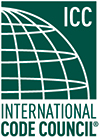 |
ICC Training & Certification |
| Stay connected on the latest ICC educational events and top-quality certification opportunities |
| —*ADVERTISEMENT— |
 |
| Some links may take you outside of the Code Council's website. ICC is not responsible for the content and privacy practices of outside websites. |
| —*ADVERTISEMENT— |
 |
| Professional Development Council Named; ICC Preferred Provider Program Closer to Launch The new Professional Development Council (PDC) was recently established to better coordinate career path resources for ICC Members and other stakeholders by utilizing shared knowledge between ICC Education and Certification programs. The ICC Board of Directors approved the new Council Policy #45 in April 2014 to create the PDC and by which it will be governed. This critical new Council, chaired by Cindy Davis, CBO, replaces both BIPS and the Education Committee, and is composed of two six-member committees: a Certification Committee and an Education Committee. A major purpose of the PDC is to align the ICC Education and Certification Programs to ensure quality training is available to meet the needs of ICC Members, all ICC educational customers and ICC Certification holders while maintaining the credibility and validity of the ICC Certification Program. The PDC also will be responsible for reviewing the soon to be enacted Preferred Provider Program as well as other ICC education and certification activities. The Preferred Provider Program being developed will serve to expand the number of training topics and opportunities available to ICC Members, Chapters and others in the construction industry. The program will be a vehicle for Chapters and other education and industry providers to offer quality educational programs to code and fire officials, architects, engineers, designers, contractors and all industry professionals. A stakeholder group, made up of ICC Members from across the country representing ICC Chapters, jurisdictions, associations, educators and other industry groups held several meetings. More opportunities for feedback, comments and discussion are planned to continue to address topics such as: • Qualifying and assessing potential Preferred Providers • Criteria for determining course objectives, quality and delivery methods • On-site and online training models, along with hybrid models that allow for education session via Skype or similar online technology • Ways to ensure ICC Members and all customers, Chapters, industry and building professionals benefit from the Preferred Provider Program The Preferred Provider Program will ensure quality education on a full range of topics is available in a greater range of formats and with increased availability so that training on timely subject matter is readily available. Answers to many Frequently Asked Questions about this new program are now available. The ICC Preferred Provider Program will launch this fall. Oversight will be provided by the PDC. Click here for more information about ICC Education and Certification programs. |
| Back to top |
| Learn from the Experts at the ICC Plan Review Institute Myrtle Beach, S.C. | August 4-8 Improve your efficiency as you review structural, nonstructural and residential plans step-by-step with nationally respected educators. At ICC's five-day Plan Review Institute, you will learn from the source of the codes as you improve your technical skills through interactive practice exercises and engaging question-and-answer sessions. You will receive valuable tools and detailed checklists you can immediately put to use upon returning to work. After completing the Institute, you will be better able to: perform effective and efficient structural, nonstructural and residential plan reviews in compliance with the 2012 International Building Code and 2012 International Residential Code; identify when minimum code requirements have not been met and cite applicable code sections; and review plans for code compliant building planning and evaluate plans for fire-resistant R-rated construction. In addition, you will have the opportunity to network and expand your professional contacts while exchanging industry best practices. Earn 3.0 CEUs when you join your peers from around the country at this valuable training. Make your plans before June 15 to take advantage of ICC's special discounted hotel rate at the Ocean Creek Resort. The spring 2014 Plan Review Institute sold out — register today to attend this comprehensive training offered by ICC, the source of the codes. For additional questions, we can be reached by email at icctraining@iccsafe.org or by phone at 888-ICC-SAFE (422-7233) ext. 33818. |
| Back to top |
Sharpen Skills, Network, Earn CEUs at Residential Inspection Institute Chicago, IL | September 15-19 |
| Back to top |
Overview of 2013 CALGreen, Commissioning Requirements Mission Viejo, CA | August 4 |
| Back to top |
Affected Communities Have 72 Hours to Assess the Damage from a Disaster After a natural disaster, everyone needs to be prepared to help a community recover. Building departments can't do it alone—engineers, architects, emergency management and community emergency response teams should all be ready to help their community in the event of a disaster. Are you ready if called upon to help? |
| Back to top |
| —*ADVERTISEMENT— |
 |